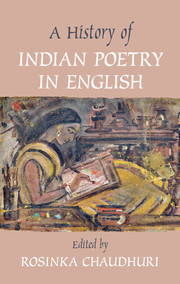Book contents
- Frontmatter
- Contents
- Contributors
- Acknowledgments
- Introduction
- SECTION I THE BROAD NINETEENTH CENTURY: INDIANS IN ENGLISH AND THE ENGLISH IN INDIA
- SECTION II PUBLISHERS, PUBLISHING HOUSES, AND THE PERIODICAL PRESS
- SECTION III POETRY: 1950–2000
- 13 Nissim Ezekiel: Poet of a Minor Literature
- 14 Dom Moraes: A Poet's Progress
- 15 Interpretative Testimony: Kamala Das and Eunice de Souza
- 16 Adil Jussawala and the Double Edge of Poetry
- 17 Arvind Krishna Mehrotra and the Interplay of Languages
- 18 Arun Kolatkar: A Singular Poetry in Two Languages
- 19 Imagery and Imagination in the Poetry of Jayanta Mahapatra
- 20 Modernisms and Modernity: Keki Daruwalla and Gieve Patel
- 21 The Third Generation: Melanie Silgardo and Manohar Shetty
- SECTION IV POETS OF THE DIASPORA
- SECTION V THE NEW MILLENNIUM POETS ON THEMSELVES
- Bibliography
- Index
21 - The Third Generation: Melanie Silgardo and Manohar Shetty
from SECTION III - POETRY: 1950–2000
Published online by Cambridge University Press: 05 March 2016
- Frontmatter
- Contents
- Contributors
- Acknowledgments
- Introduction
- SECTION I THE BROAD NINETEENTH CENTURY: INDIANS IN ENGLISH AND THE ENGLISH IN INDIA
- SECTION II PUBLISHERS, PUBLISHING HOUSES, AND THE PERIODICAL PRESS
- SECTION III POETRY: 1950–2000
- 13 Nissim Ezekiel: Poet of a Minor Literature
- 14 Dom Moraes: A Poet's Progress
- 15 Interpretative Testimony: Kamala Das and Eunice de Souza
- 16 Adil Jussawala and the Double Edge of Poetry
- 17 Arvind Krishna Mehrotra and the Interplay of Languages
- 18 Arun Kolatkar: A Singular Poetry in Two Languages
- 19 Imagery and Imagination in the Poetry of Jayanta Mahapatra
- 20 Modernisms and Modernity: Keki Daruwalla and Gieve Patel
- 21 The Third Generation: Melanie Silgardo and Manohar Shetty
- SECTION IV POETS OF THE DIASPORA
- SECTION V THE NEW MILLENNIUM POETS ON THEMSELVES
- Bibliography
- Index
Summary
In a chronology of modern Indian English poetry, Surjit S. Dulai begins the timeline by referring to C. R Mandy, the editor of the Illustrated Weekly of India in 1947, as someone who “encourage[ed] local literary writers.” Tracing three generations of poets, beginning from Nissim Ezekiel, he cites the third generation as beginning in the 1970s, when a student of Ezekiel's, Santan Rodrigues, publishes a poetry collection titled I Exist in 1976. That generation included several new poets – many of whom were mentored by Ezekiel – who went on to found publishing presses and publish their own work, including Melanie Silgardo and Manohar Shetty. These new poets, Dulai writes, “move away from radical modernist techniques. They are more concerned with the portrayal and assessment of their family background, their own lives and relations with others, and their immediate environment.” This chapter will focus on the poetic oeuvre of Silgardo and Shetty as poets occupied with the familiar, outlining their concerns and poetic styles, and attempting to tease out the overlaps between their respective bodies of work.
Melanie Silgardo was “born in 1956 in Bombay to Roman Catholic parents,” subsequently going on to study English at St. Xavier's College in Bombay. A selection of her poems first appeared in the 1978 volume Three Poets – the first of four collections of poetry launched by the “short-lived collective” Newground that she founded along with fellow Bombay poets Santan Rodrigues and Raul D'Gama Rosein the same year. In 1985, as part of her course at the London College of Printing, Silgardo produced a second volume of poems titled Skies of Design, which went on to win the Best First Book Commonwealth Poetry Prize, Asian Section.
Silgardo's early work demonstrates a preoccupation with violence – particularly sexual abuse and the unraveling of a disrupted mind – that continues through her published work, but that is at its most assertive and “adrenalized” in the poems in Three Poets. The voices in Silgardo's poems are not merely victims of violence, they are also perpetrators – and, ultimately, witnesses. They “fall,” “break,” “scratch,” “slap,” and “scream,” but they also watch “daily faces crumple, / die in front of mirrors” and mourn the dead “bundled in the van / your entrails angry and hanging loose.” Rodents and scavengers litter her landscapes, as do crowds: aggressive and urban.
- Type
- Chapter
- Information
- A History of Indian Poetry in English , pp. 328 - 344Publisher: Cambridge University PressPrint publication year: 2016



